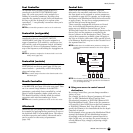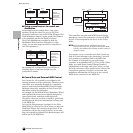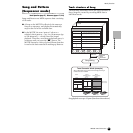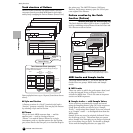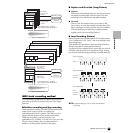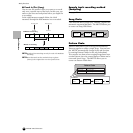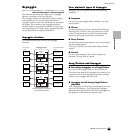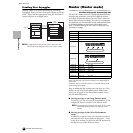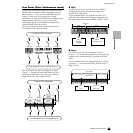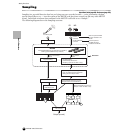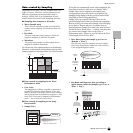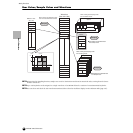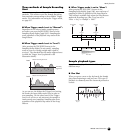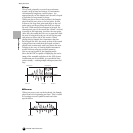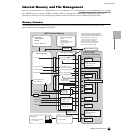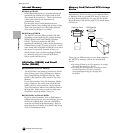
57
MOTIF Basic Structure
Main functions
Basic Structure
Four Zones (Voice Performance mode)
In the Voice Performance mode, the keyboard can be
divided into a maximum of four separate Zones (as
shown below) — each with its own MIDI channel
setting. In this way, you can use just a single
keyboard to control several different instrument parts
independently. Moreover, you can have these
independent Zones control different channels on
connected MIDI devices as well.
You can set these four Zones and store them as a
User Master in the Master mode.
The four Zones can also be configured as Voice
“layers” — letting you have more than one Voice
sound at the same time when you play within a
single Zone. (See the example below.)
■ Split
You can use the Zone settings to create a “Split” —
dividing the keyboard into two key ranges, at a
specific note (split point).
In the example below, the keyboard is split at C3,
with the lower range used to trigger Arpeggios, and
the upper range used conventionally to play a Voice.
■ Layer
You can also use the Zone settings to create a
“Layer” — in which the keyboard is used to play two
separate parts simultaneously, in unison with each
other.
In the example below, the keyboard plays two Voices
in unison — one an internal Voice, and the other a
Plug-in Voice.
MIDI ch1
MIDI OUT MIDI OUT MIDI OUT MIDI OUT
MIDI ch2 MIDI ch3 MIDI ch4
Tone Generator block (Internal/Plug-in)
External Tone Generator
Keyboard (Max 4 zone)
ZONE2 ZONE3ZONE1
ZONE4
MIDI ch1
MIDI OUT MIDI OUT
MIDI OUT
MIDI OUT
MIDI ch2 MIDI ch3
MIDI ch4
Tone Generator block (Internal/Plug-in)
External Tone Generator
Ch1
Part 1
For playing
Arpeggios
Ch2
Part 2
For playing a Voice
Lower Upper
Split point
(C3)
Layer (Upper)
Layer (Lower)
Part 1
Voice
Plug-in 1 Part
Plug-in Voice



